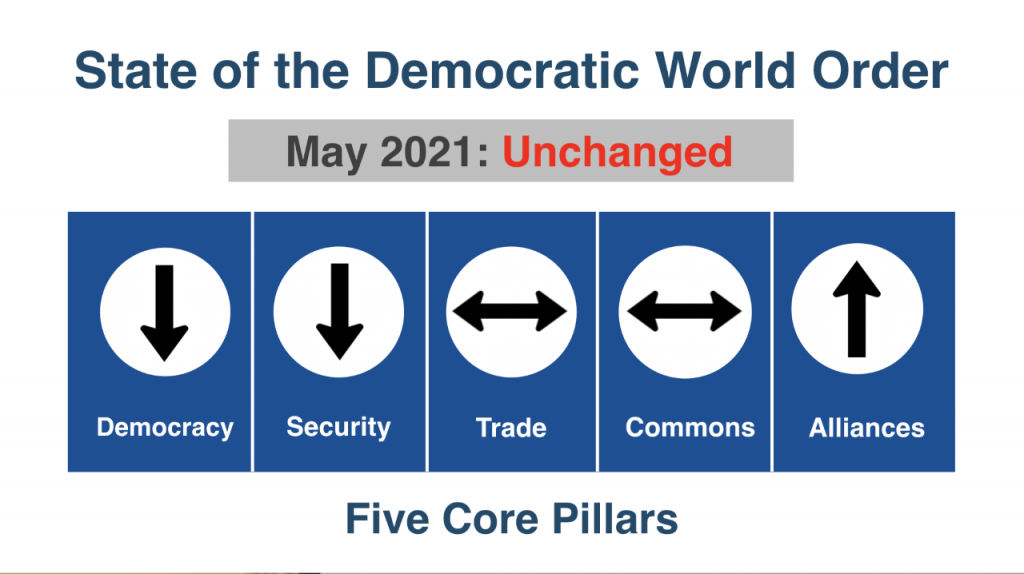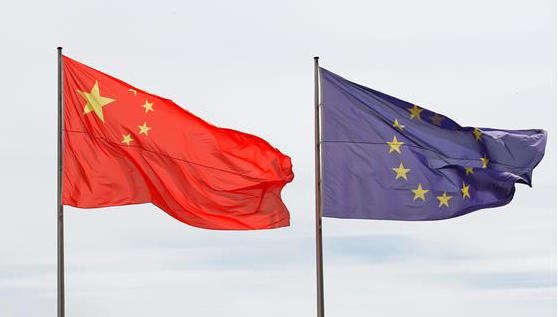Reshaping the order
This month’s topline events
EU-China Deal Halted. By an overwhelming majority, the European Parliament voted to suspend ratification of the Comprehensive Agreement on Investment (CAI), a deal that would have expanded trade and investment ties between China and the European Union. The move comes after Beijing had imposed retaliatory measures against EU members of parliament for their support of sanctions against Beijing for its oppression of the Uighur population. Separately, the EU joined a G7 Foreign Ministers statement that criticized China’s human rights record and coercive economic practices, and pledged to work collectively to address these concerns.
- Shaping the order. The EU’s decision to freeze the CAI and join the G7 consensus reflects growing disenchantment with China and could signal a strategic shift in Europe’s willingness to stand up more firmly to Beijing. Still, China remains Europe’s largest trading partner, and any moves against Beijing could open the door to escalating economic retaliation — a prospect that may limit how far European governments are willing to go in joining US efforts to pressure China.
- Hitting Home. An alignment of views between the US and its European allies on how to deal with China could help create a united front, making it more difficult for Beijing to engage in unfair trade practices that harm US businesses and consumers.
- What to do. The Biden administration should continue its efforts, including through the nascent US-EU China dialogue, to develop a common strategic approach among leading democracies to deter Beijing’s unfair economic practices.
Belarus Hijacking. Belarus forced the landing of an Irish airline flying through its airspace to detain a journalist, Roman Protasevich, an outspoken critic of Belarus president Alexander Lukashenka’s dictatorial regime. In a visible show of support, Russian president Vladimir Putin hosted Lukashenka for a bilateral summit, after Russian Foreign Minister Lavrov defended the forced landing as “absolutely reasonable.” In response, European governments responded by restricting flights over Belarus, and the US and EU outlined plans for new sanctions against Belarus, while the G7 issued a strong statement of condemnation.
- Shaping the order. The brazen action by Belarus, in direct violation of civil aviation rules, represents an emboldened stance by authoritarian regimes to take actions aimed at silencing critics located outside of their territories. Russia, China, Turkey, Saudi Arabia, and autocratic powers have stepped up extra-territorial moves against opposition figures, journalists, and citizens that criticize their regimes – a troubling development that poses a serious challenge to democratic norms and a rules-based order.
- Hitting Home. This incident could have direct impacts for Americans flying overseas, extending flight times as airlines shift routes to avoid Belarus and increasing the risk of future in-flight incidents like this one. Other extra-territorial activities have involved Chinese efforts to penalize students at American universities, Turkish security agents beating critics on US soil, and Saudi Arabia’s alleged assassination of US resident Jamal Khashoggi.
- What to do. Washington should join its allies and partners to impose sanctions on Belarusian officials and state enterprises and enhance support for Belarus’ pro-democracy groups, while developing a coherent approach to deter autocratic regimes from engaging in extra-territorial actions to silence regime critics.
Israel-Gaza Conflict. Following a barrage of rocket attacks by Hamas inside Israel, Israeli military forces responded with a campaign of retaliatory airstrikes against Palestinian militants in Gaza – an escalating conflict that ended after eleven days of violence and civilian casualties on both sides. The Biden Administration, which sought to pursue private diplomatic efforts to persuade Israeli Prime Minister Benjamin Netanyahu to reach a cease-fire, came under criticism for blocking a UN Security Council statement demanding an end to the conflict.
- Shaping the order. The revival of military conflict between Israel and Hamas underscores that the unsettled Israeli-Palestinian conflict presents an ongoing challenge to a rules-based order in the Middle East. Hamas, backed by Iran and other groups opposed to Israel’s existence, appears to have gained political support among Palestinians and sympathizers around the world, while the US is once again seen as isolated in its support for Israel – developments that could make a two-state solution even harder to achieve.
- Hitting Home. The conflict in the Middle East has intensified a growing political divide in Congress over America’s support for Israel and its role in the Middle East.
- What to do. With a ceasefire in place, the Biden administration should focus on efforts to keep the two-state solution alive, and look to engage Israel’s new political leadership, with the announcement that a coalition of right and left-wing political parties have agreed to a form a government to oust Netanyahu.
Quote of the Month
“We commit to strengthening open societies, shared values, and the rules-based international order. We affirm that free and fair trade, and the free and secure flow of capital, data, knowledge, ideas and talent is essential to our long-term prosperity. We affirm that liberal democracy and free and fair markets remain the best models for inclusive, sustainable social and economic advancement.“
– G7 Foreign and Development Ministers Communiqué

State of the Order this month: Unchanged
Assessing the five core pillars of the democratic world order
Democracy (↓)
- As discussed above, Belarus’ hijacking of the Ryanair flight and seizure of journalist Roman Protasevich presents a serious violation of democratic norms and the rule of law.
- Mali’s interim president and prime minister were ousted by Assimi Goita, the head of a military junta who led last year’s coup, a move that was condemned by the US, EU, and the African Union. The “coup within a coup” represents a further setback in Mali, once a beacon for democracy and stability in Africa
- The civilian death toll climbed to over 800 in Myanmar, according to a new report by an activist group, as protests continued against the military government that seized power in a coup in February.
- Overall, the democracy pillar was weakened.
Security (↓)
- As described above, Hamas unleashed a wave of new rocket attacks inside Israel, which responded with a campaign of retaliatory airstrikes against militants in Gaza, a conflict that resulted in the deaths of 13 Israeli and 250 Palestinian civilians.
- Chinese President Xi Jinping and Russian President Vladimir Putin participated in a videoconference to launch a series of nuclear energy projects, an event that highlighted the deepening economic and strategic ties between the two nations.
- The Biden administration informed Russia that it will not rejoin the Open Skies arms control agreement, confirming it will adhere to the Trump administration’s decision to withdraw from the pact last year.
- Overall, the overall security pillar was weakened.
Trade (↔)
- The EU decided to withhold the imposition of new tariffs against US alcohol products, which were set to take effect in retaliation for the Trump administration’s tariffs against European steel and aluminum. The decision allows talks between US and EU officials on trade cooperation to continue.
- As noted above, the European Parliament agreed to temporarily suspend ratification of a comprehensive investment agreement with China, a move that may limit the expansion of trade and investment between the EU and China.
- On balance, the global trade pillar remained unchanged.
Commons (↔)
- President Biden ordered US intelligence agencies to conduct a more thorough investigation into the origins of the coronavirus, a move that could help clarify whether the virus emerged from an accidental leak from the Wuhan Institute of Virology last fall.
- The World Health Organization authorized China’s Sinopharm COVID-19 vaccine for emergency use, despite some experts expressing “very low confidence” in Sinopharm’s data on the vaccine’s safety.
- Meeting in London, G7 environmental ministers agreed to ambitious new climate goals, including emissions targets that would limit the Earth’s warming to 1.5 degrees Celsius above preindustrial levels.
- The US Navy continued to deny China’s claims of territorial jurisdiction over international waters, sailing a US warship through the South China Sea despite Beijing’s protests.
- China successfully landed a spacecraft on Mars, becoming the second nation after the United States to land and operate a rover on the planet.
- On balance, the global commons pillar was unchanged.
Alliances (↑)
- G7 Foreign Ministers, meeting in London, issued a strong statement affirming their support for democracy and shared values, while pledging to work together to “deter Russia’s behavior that it undermining the rules-based international system” and calling on China to “respect human rights and fundamental freedoms.”
- Germany welcomed the waiver by the Biden administration of certain US sanctions related to Russia’s Nord Stream 2 gas pipeline, a move aimed at strengthening relations with Berlin while talks continue over how to mitigate adverse impacts of the project. But the agreement was criticized by other US allies, including Poland and Ukraine, that saw this as Washington’s acquiescence to the project, despite the benefits it provides to Russia.
- South Korean President Moon Jae-in became the second world leader to visit the White House for a meeting with Biden that focused on investments to foster technology cooperation and shared concerns regarding North Korea.
- In Reykjavik at a meeting of the Arctic Council, Secretary of State Blinken reaffirmed efforts to work together with Canada, Sweden, Norway, Finland, Denmark, and Iceland to push back on Russia’s activities in the Arctic. Blinken also visited Copenhagen to mend ties after relations with Denmark were strained when the Trump administration sought to purchase Greenland.
- Overall, the alliances pillar was strengthened.
Strengthened (↑)________Unchanged (↔)________Weakened (↓)
What is the democratic world order? Also known as the liberal order, the rules-based order, or simply the free world, the democratic world order encompasses the rules, norms, alliances, and institutions created and supported by leading democracies over the past seven decades to foster security, democracy, prosperity, and a healthy planet.
This month’s top reads
Three must-read commentaries on the democratic order
- Brian Klaas, in the Washington Post, suggests that the Belarus hijacking is a test case in the global showdown between democracies and dictatorships that requires a stronger and more creative response.
- Christopher Walker and Jessica Ludwig describe in Foreign Affairs how China and Russia have adapted their authoritarian techniques to the digital era with the aim of making the world safer for autocracy.
- David Miliband, writing in Foreign Affairs , suggests that the Biden administration will need to rally a coalition of governments, private businesses, and civil society to build “countervailing power” against the forces of authoritarianism and impunity.
Action and analysis by the Atlantic Council
Our experts weigh in on this month’s events
- Fred Kempe, writing for CNBC, argues that China is ramping up its diplomatic bravado and military assertiveness in a bid to test the Biden administration’s response.
- Dan Fried outlines in the New Atlanticist a pro-active approach for how the US and the democratic world should respond to Lukashenka’s hijacking of a civilian airliner.
- Writing in Foreign Policy, Dan Fried and Adrian Karatnycky make the argument for a new sanctions strategy to put serious economic pressure to contain Putin’s Russia.
- On May 21, the Scowcroft Center hosted a virtual private strategy session with experts and officials from D-10 nations to discuss the future of the G7 and potential options to formalize a D-10.
- Matthew Kroenig appeared on Times Radio to discuss escalating violence in Israel and Gaza.
__________________________________________________
The Democratic Order Initiative is an Atlantic Council initiative aimed at reenergizing American global leadership and strengthening cooperation among the world’s democracies in support of a rules-based democratic order. Sign on to the Council’s Declaration of Principles for Freedom, Prosperity, and Peace by clicking here.
Ash Jain – Senior Fellow
Dan Fried – Distinguished Fellow
Jeffrey Cimmino – Assistant Director
Joel Kesselbrenner – Program Assistant
Paul Cormarie – Georgetown Student Researcher
If you would like to be added to our email list for future publications and events, or to learn more about the Democratic Order Initiative, please email AJain@atlanticcouncil.org.
